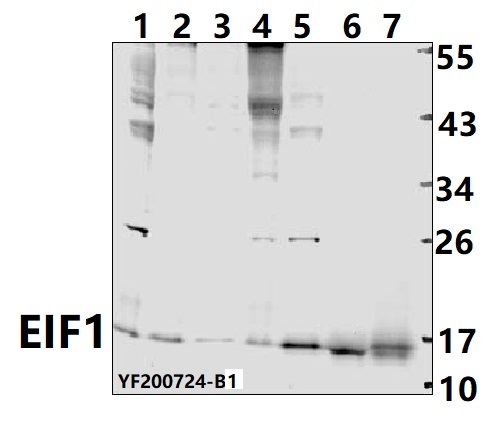Product Name :
EIF1 polyclonal antibody Background :
In mammalian cells, translation is controlled at the level of polypeptide chain initiation by initiation factors. Eukaryotic translation initiation factor 1 (eIF1) is crucial for the scanning process in vitro. During the scanning process, eIF1 is a component of a complex involved in recognition of the initiator codon. Translation is also initiated by the role of eIF1 in regulating the activity of ribosomal subunits 43S, 48S and 40S. eIF1 enables 43S ribosomal complexes to discern between cognate and near-cognate initiation codons, sensing the nucleotide content of initiation codons. It is also a promotor, along with eukar-yotic translation initiation factor 1A (eIF1A), for assembly of 48S ribosomal complexes at the initiation codon of a conventional capped mRNA. In addition, eIF1 and eIF1A, together with eukaryotic translation initiation factor 5 (eIF5), function in the formation of stable 40S ribosomal preinitiation complexes. Product :
Rabbit IgG, 1mg/ml in PBS with 0.02% sodium azide, 50% glycerol, pH7.2 Storage&Stability :
Store at 4°C short term. Aliquot and store at -20°C long term. Avoid freeze-thaw cycles. Specificity :
EIF1 polyclonal antibody detects endogenous levels of EIF1 protein. Immunogen :
A synthetic peptide corresponding to residues in Human EIF1. Conjugate :
Unconjugated Modification :
Unmodification
EIF1 polyclonal antibody Background :
In mammalian cells, translation is controlled at the level of polypeptide chain initiation by initiation factors. Eukaryotic translation initiation factor 1 (eIF1) is crucial for the scanning process in vitro. During the scanning process, eIF1 is a component of a complex involved in recognition of the initiator codon. Translation is also initiated by the role of eIF1 in regulating the activity of ribosomal subunits 43S, 48S and 40S. eIF1 enables 43S ribosomal complexes to discern between cognate and near-cognate initiation codons, sensing the nucleotide content of initiation codons. It is also a promotor, along with eukar-yotic translation initiation factor 1A (eIF1A), for assembly of 48S ribosomal complexes at the initiation codon of a conventional capped mRNA. In addition, eIF1 and eIF1A, together with eukaryotic translation initiation factor 5 (eIF5), function in the formation of stable 40S ribosomal preinitiation complexes. Product :
Rabbit IgG, 1mg/ml in PBS with 0.02% sodium azide, 50% glycerol, pH7.2 Storage&Stability :
Store at 4°C short term. Aliquot and store at -20°C long term. Avoid freeze-thaw cycles. Specificity :
EIF1 polyclonal antibody detects endogenous levels of EIF1 protein. Immunogen :
A synthetic peptide corresponding to residues in Human EIF1. Conjugate :
Unconjugated Modification :
Unmodification
-
 Western blot (WB) analysis of EIF1 pAb at 1:500 dilution Lane1:A549 whole cell lysate(40ug) Lane2:Raw264.7 whole cell lysate(40ug) Lane3:U-87MG whole cell lysate(40ug) Lane4:THP-1 whole cell lysate(40ug) Lane5:PC3 whole cell lysate (40ug) Lane6:The lung tissue lysate of Rat (40ug) Lane7:The spleen tissue lysate of Mouse(40ug)
Western blot (WB) analysis of EIF1 pAb at 1:500 dilution Lane1:A549 whole cell lysate(40ug) Lane2:Raw264.7 whole cell lysate(40ug) Lane3:U-87MG whole cell lysate(40ug) Lane4:THP-1 whole cell lysate(40ug) Lane5:PC3 whole cell lysate (40ug) Lane6:The lung tissue lysate of Rat (40ug) Lane7:The spleen tissue lysate of Mouse(40ug)
Bioworld Biotech only provide peptides for our antibodies and do not provide additional peptide customization services.
Price/Size :
USD 368/1mg/vial
Tips:
For phospho antibody, we provide phospho peptide(0.5mg) and non-phospho peptide(0.5mg).Describe :
Blocking peptides are peptides that bind specifically to the target antibody and block antibody binding. These peptide usually contains the epitope recognized by the antibody. Antibodies bound to the blocking peptide no longer bind to the epitope on the target protein. This mechanism is useful when non-specific binding is an issue, for example, in Western blotting (WB) and Immunohistochemistry (IHC). By comparing the staining from the blocked antibody versus the antibody alone, one can see which staining is specific; Specific binding will be absent from the western blot or IHC performed with the neutralized antibody.Formula:
Synthetic peptide was lyophilized with 100% acetonitrile and is supplied as a powder. Reconstitute with 0.1 ml DI water for a final concentration of 10 mg/ml.The purity is >90%,tested by HPLC and MS.
Storage:
The freeze-dried powder is more stable. For short time at 2-8°C. For long term storage store at -20°C.
Note :
This product is for research use only (RUO only). Not for use in diagnostic or therapeutic procedures.
 EIF1 polyclonal antibody
EIF1 polyclonal antibody  Datasheet
Datasheet COA
COA MSDS
MSDS SHIP
SHIP